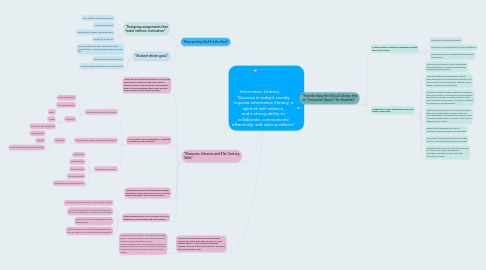
1. "Libraries and museums helped Americans acquire skills that are today defined as “21st century skills”—such as critical thinking, problem solving, information literacy, and civic literacy, to name a few."
1.1. "Libraries and museums—and the people they serve—stand to benefit from becoming more intentional and purposeful about accommodating the lifelong learning needs of people in the 21st century, and doing this work collaboratively in alignment with community needs."
2. "Researching Stuff is the Best"
2.1. "Designing assignments that foster intrinsic motivation"
2.1.1. "the learner's motivation is key"
2.1.2. "Infuse playfulness"
2.1.3. "Encourage student-centered goals"
2.1.4. "Allow for creativity"
2.2. "Student driven goals"
2.2.1. "Allow students to help decide their own project topics, questions they wish to pursue, etc."
2.2.2. "Encourages lifelong learning"
2.2.3. "Helps prepare students for the "real world"
3. "Museums, Libraries and 21st Century Skills"
3.1. "Given the accelerating economic, social, and educational changes of the 21st century, today’s libraries and museums face dramatic shifts in the populations they serve and the communities in which they operate"
3.2. "21st Century Skills Framework – Adapted for Libraries and Museums "
3.2.1. "Learning and Innovation Skills"
3.2.1.1. "Critical thinking"
3.2.1.2. "Communication"
3.2.1.3. "Literacy"
3.2.1.3.1. Basic
3.2.1.3.2. Visual
3.2.1.3.3. Scientific and numerical
3.2.2. "Information, media and technology skills"
3.2.2.1. "Literacy"
3.2.2.1.1. "Information"
3.2.2.1.2. 'Media"
3.2.2.1.3. "Communications and technology"
3.2.3. "Life and career skills"
3.2.3.1. "Flexibility"
3.2.3.2. "Adaptability"
3.2.3.3. "Productivity"
3.2.3.4. "Accountability"
3.2.3.5. "Leadership and responsibility"
3.3. "Competencies like critical thinking, global awareness, and media literacy are no longer simply desirable—they are necessary. "
3.4. "How should libraries and museums evolve as institutions of learning in the 21st century"
3.4.1. "Combination of audience- and content-driven"
3.4.2. "Multi-directional (co-created experiences involving institution, audiences, and others)"
3.4.3. "Focus on audience engagement and experiences"
3.4.4. "Embedded in community (aligned with and acts as a leader on community needs/issues)"
4. "Transforming the School Library into an “Innovation Space” for Students"
4.1. School libraries should be considered a great innovation space
4.1.1. "Students can pursue answers"
4.1.2. "Students can find answers to their questions"
4.1.3. Libraries can be an "imagination playground" for students
4.2. Suggestions/ ways that libraries can help mentor innovation
4.2.1. "Ensure that students acquire the inquiry and digital literacy skills they need to be independent innovators"
4.2.2. "Teach brainstorming and other creative idea-generation techniques that students can use in groups or individually to explore a wide range of solutions to problems"
4.2.3. "Actively collaborate with classroom teachers who are involved in innovation activities within the school or enlist a teacher partner to start such activities (seek ways to tie these activities to Common Core standards)"
4.2.4. "Become active mentors to young innovators who may not have the parental or teacher encouragement and support to give them the confidence they need to persist in the face of challenge and failure"
4.2.5. "Explore with students the lives of successful child inventors from the past"
4.2.6. "Post deep thinking questions around the library to stimulate curiosity and interest"
4.2.7. "Demonstrate that out-of-the-box thinking is valued, and accept and explore outrageous questions and seemingly off-the-wall ideas"
